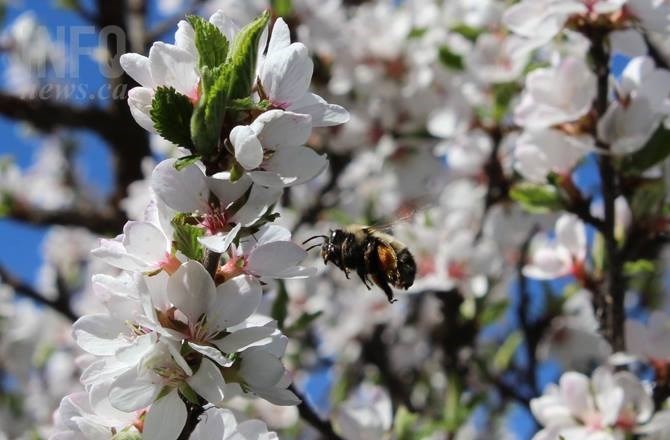
Image Credit: FILE PHOTO
January 25, 2017 - 2:38 PM
KAMLOOPS - Kamloops will soon be able to add a new title to its resume; Bee City.
Kamloops will be the first Bee City in B.C., and the third in Canada, after Toronto and Chestermere near Calgary. With the designation will come pollinator education, an edible garden and, hopefully, a small bump in tourism says Tourism Kamloops’s Lisa Strachan.
“Some people do travel for specific niches like this,” she says. “It just gives us another market to promote that.”
The edible garden is planned for the city’s tourism centre.
“We’re thinking it could be some raised planters that we put in that have bee friendly flowers, but also vegetable garden, herb garden, stuff like that,” Strachan says.
The garden will be open to the public, so visitors can get there hands dirty, she says. Locals will also be allowed to come and pick veggies or herbs when they’re ready.
New tourism dollars are just one aspect. Education around pollinators is an essential part of the designation, as bees play a big role in food production and plant life.
Glen Grant of the B.C. Wildlife Park was involved in pitching the idea to the city.
“What we want to do is actually educate the public on making sure they can plant a pollinator friendly garden,” he says.
He says habitat loss due to urban sprawl is causing pollinator populations to fall. As neighbourhoods grow, flowering plants are disappearing in favour of buildings and infrastructure. Even when homeowners do add green space, the majority of it is grass.
“Once a house is built, they plant green space, they plant lawn,” he says. “A lot of the chemical pesticides will kill some of the natural flowers and weeds that they do rely on. As the city grows and sprawls, some of that natural habitat is lost.”
The loss of bee habitat and dwindling pollinator has become a bigger issue in the past few years. Grant says that can affect local food production.
“85 per cent of all the plants need pollinators to reproduce, especially fruits and vegetables,” he says. “So if we don’t have the bees around, or other pollinators, then it’s not going to bode very well for the vegetation around Kamloops.”
The designation from Bee City Canada is something the city must apply for, which city council gave the go ahead for yesterday, Jan. 24. While being a Bee City does mean more education and bee related activities in the city, it’ll effectively cost nothing as work was already being done by city staff or community partners.
To contact a reporter for this story, email Brendan Kergin or call 250-819-6089 or email the editor. You can also submit photos, videos or news tips to the newsroom and be entered to win a monthly prize draw.
We welcome your comments and opinions on our stories but play nice. We won't censor or delete comments unless they contain off-topic statements or links, unnecessary vulgarity, false facts, spam or obviously fake profiles. If you have any concerns about what you see in comments, email the editor in the link above.
News from © iNFOnews, 2017